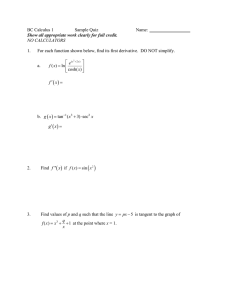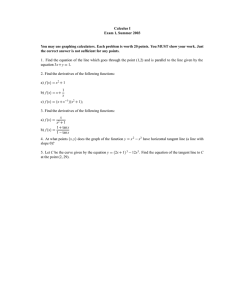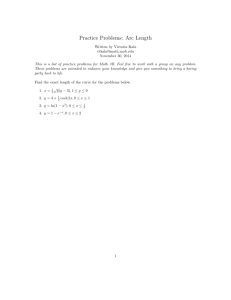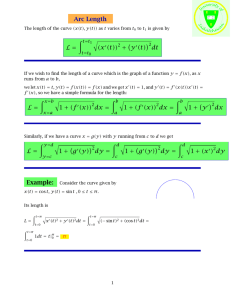Quiz Key
advertisement
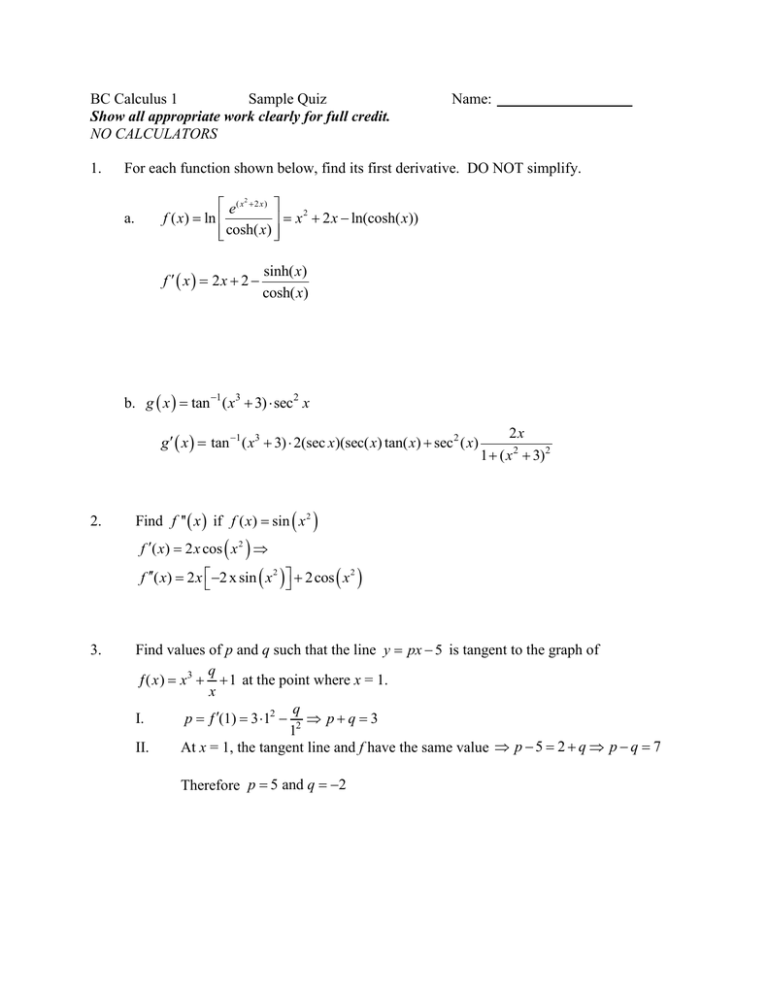
BC Calculus 1 Sample Quiz Show all appropriate work clearly for full credit. NO CALCULATORS 1. Name: For each function shown below, find its first derivative. DO NOT simplify. e( x 2 x ) 2 f ( x) ln x 2 x ln(cosh( x)) cosh( x ) 2 a. f x 2x 2 sinh( x) cosh( x) b. g x tan 1 ( x3 3) sec2 x g x tan 1 ( x3 3) 2(sec x)(sec( x) tan( x) sec 2 ( x) 2. 2x 1 ( x 2 3) 2 Find f '' x if f ( x) sin x 2 f ( x) 2 x cos x 2 f ( x) 2 x 2 x sin x 2 2cos x 2 3. Find values of p and q such that the line y px 5 is tangent to the graph of q x x3 1 at the point where x = 1. x q p 2 2 p q 3 I. 1 II. At x = 1, the tangent line and f have the same value p 5 2 q p q 7 Therefore p 5 and q 2 3a. Suppose h( x) f ( g ( x)) . Given the information about , g and their derivatives provided in the table, fill in the missing information. 2 x 1 2 4 f x 3 –1 5 f x –1 8 6 g ( x) 4 2 1 g ( x) 1 4 3 h( x ) 25 1 h( x ) 60 -64 Work space: 3b. Given the information above, suppose that k ( x) f ( g ( x)) where k is one-to-one and d k 1 ( x ) at x = 5. differentiable. Evaluate the dx d 1 k 1 ( x) dx k (k 1 ( x)) Now, k (1) 5 k 1 (5) 1 , and k ( x) f ( g ( x)) g( x) k (k 1 (5)) k (1) f ( g (1)) g(1) f (4) g(1) 6 1 . d 1 1 k 1 ( x) x 5 Therefore, 1 dx k (k (5)) 6 ln( x) 1 . Determine the exact value of x for which this function has a stationary x point, then determine whether k has a local max, a local min, or neither at this point. Be sure to justify. Let k x 4. 1 x (ln( x) 1 ln( x) k x x 2 x x2 ln( x) 1 has a stationary point at x = 1. x ln( x) ln( x) Since k x 0 when x (0,1), and k x 0 when x (1, ) , 2 x x2 it follows that k has a local maximum at x = 1. k x 0 ln( x) 0 x 1 . So k x 5. Consider the curve defined by the equation 3 y3 12 x2 y 16 x3 16 . a. dy . dx 24 xy 48 x 2 Use implicit differentiation to determine 9 y 2 y 12 x 2 y 24 xy 48x 2 0 y b. 9 y 2 12 x 2 8 xy 16 x 2 3 y 2 4 x2 Find any point(s) on the curve where the tangent line to the curve is horizontal. 8xy 16 x2 0 8x( y 2 x) 0 x 0 or y 2 x Looking at the curve 3 y3 12 x2 y 16 x3 16 x 0 3 y3 16 y 3 16 ,and 3 y 2 x 3(2 x)3 12 x2 (2 x) 16 x3 16 16 x3 16 x 1 16 So, there are horizontal tangents at 0, 3 and (1,2) 3 Concepts: 6. Show that if x2 y 2 xy 42 , then dy y . dx x d 2 2 d dy dy x y xy (42) 2 xy 2 2 x 2 y 1 y x 0 dx dx dx dx dy 2 x 2 y x 2 xy 2 y dx dy y (2 xy 1) dx x(2 xy 1) dy y dx x 7. A function y f ( x) is said to satisfy the Grand L. Liu Condition if it satisfies the formula f ( x) f ( x) 2 . Find all functions that satisfy the Grand L. Liu Condition. x We want a function that when you differentiate, you get an x 2 in the derivative; something like 1 . x 1 1 f ( x) 1 But if f ( x) , f ( x) 2 2 . So we need to have g , where g doesn’t change when we x x x x differentiate. Hmmmm, do we know such a function? How about e x ? Let’s try: 1 1 1 f ( x) x f ( x) e , f ( x) e x 2 2 . x x Note: If C is any real constant, f ( x) Ce 1 x works as well. d f ( x) [ Ln f ( x) ] , dx f ( x) 2 d 1 [ Ln f ( x) ] 2 . So, let f ( x) e( something whose derivative is 1/ x ) Then , we want dx x Alternately: Noticing
